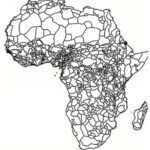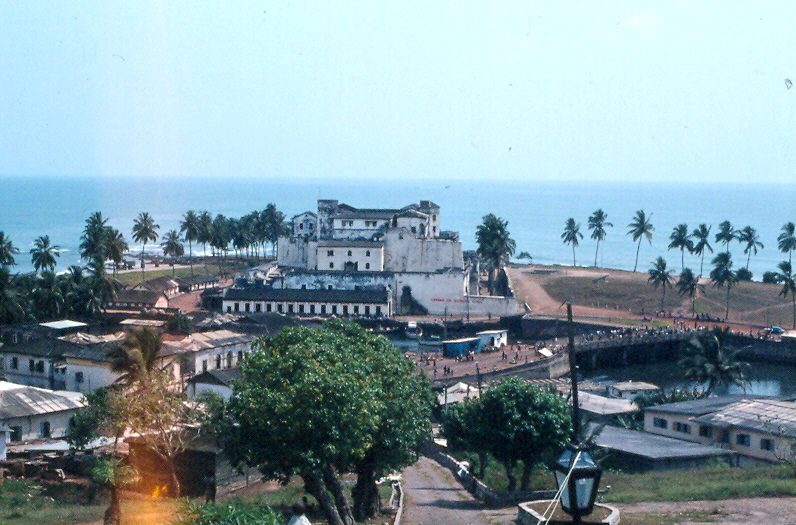Fort Elmina, Ghana
By Yoku Shaw-Taylor
“The book Barracoon resolutely records the atrocities African peoples inflicted on each other, long before shackled Africans, traumatized, ill, disoriented, starved, arrived on ships as “black cargo” in the hellish West. Who could face this vision of the violently cruel behavior of the “brethren” and the “sistren” who first captured our ancestors? Who would want to know, via a blow-by-blow account, how African chiefs deliberately set out to capture Africans for the slave trade people—men, women, children—who belonged to Africa? We are being shown the wound.”[1]
On August 1, 2023, the Asantehene Otumfuo Osei Tutu II was in Trinidad and Tobago at the invitation of Prime Minister Dr. Ketih Rowley to commemorate Emancipation Day celebrations. This was an opportunity for the Asantehene to apologise for the involvement of his kingdom in the Trans-Atlantic slave trade.
We know that the Asantes, together with the Fantes, in particular, were neck deep in fetid slave trading. The Asante wars of expansion, which began in the 1680s and continued into the next century, created a steady flow of slaves to the coast. The Fantes functioned as intermediaries between the Asante slave traders and the European slave traders. It was the tactic of the coastal Fante people to control the trade as much as possible by restricting Asante access to the European traders who came in with the big ships and big guns. It was this tension, among other issues, that eventually led the Asante to overrun Fante land in a decisive war in 1806.
Together, the Asante and Fante established a supply chain of slaves for sale and distribution to the Europeans. There is consensus among historians that the overwhelming majority of slaves sold by the Fante to the Europeans on the Gold Coast (in modern day Ghana) were supplied by the Asante. At the peak of the trade, from 1700 to 1800, the town of Anomabu exported 466,000 people; Cape Coast exported almost 318,000 people; and Elmina exported 255,000.[2] There were slave pens also owned by major African slave traders such as the father of William Ansah Sessarakoo. The towns of Elmina, Cape Coast and Anomabu expanded and became major ports among the settlements of the Fante due to the trans-Atlantic slave trade.
Why the silence? Why does the Asantehene not recognise the pain and legacy of the slave trade that casts the long shadow of racism across the world? Whether it was state-sponsored slave trading by the Asante nation, or non-state middlemen slave traders in Fante land, or marauders operating on the fringes of politically porous communities or militarily weak societies, the moral problem of slavery, and how these West African societies controlled or failed to control it, created a new reality of human relations that had begun to unmake the structures of kinship groups and produced a people who were deemed to be socially dead.
The slaves bought from the Asante and sold by the Fante were, of course, considered disposable and unredeemable within these Akan communities; a fate worse than slavery awaited them if they were not sold off: they could all be put to death. For the Europeans, they only purchased captives who had already been enslaved by the Africans. An honest telling of history will focus not only on the period of colonial domination (when Britain moved by force to claim these areas in 1874 until the Cold Coast colony gained independence in 1957), but on the two hundred years preceding that period when the Africans were autonomous and were under no foreign occupiers.
When will the Asantehene apologise for the role the kingdom played in this inhumane trade? In Wonders of the African World Henry Louis Gates Jr. writes in his diary: “While in the Asantehene’s court, I found myself longing for someone to apologise…” [3] Of course, nobody in the Asantehene’s court apologised to Professor Gates. Except for the formal, explicit, sustained expression of regret and remorse from Matthieu Kérékou, former president of Benin, and the passive admissions of guilt or regret by tour guides and officious personnel, I have not come upon, or read any words of remorse from the West Africans.
And yet, on September 20, 2023, the president of Ghana, Akuffo-Addo, made outrageous claims for reparations to African countries, for “the millions of productive Africans snatched from the embrace of our continent and put to work in the Americas and the Caribbeans without compensation for their Labor.” [4]
The president was speaking at the 78th General Assembly of the United Nations. How can Africans in Africa lay claim to reparations that rightly should go to the descendants of the victims who have experienced untold trauma from social death in the Americas, the Caribbean and Europe. What claim do Africans, African governments have to reparations for the slave trade? What happened to all the earnings from these exchanges that were going on in the domestic markets? Who benefitted from all this domestic slave trading?
The Asantehene Otumfuo Osei Tutu II in Trinidad and Tobago, August 2023. Photo courtesy: Office of the President of the Republic of Trinidad and Tobago.
The history that President Akuffo-Addo is reading is incomplete. In fact, Ghana’s esteemed scholar on slavery, Professor Emeritus Akosua Perbi has written:
“The Atlantic slave trade… did not supersede the indigenous slave trade. The two systems existed side by side and sustained each other…In Akanland, there was attention paid to the different ‘types’ of slaves: servant or akoa, pawn or awowa, slave or donko, war captive slave or dommum, slave under capital punishment or achere (akyere). The slave in these parts was “regarded as a commodity, in the sense that the slave could be bought in cash or kind. The slave could be a medium of exchange at the slave market. The slave could also be given away as a gift.” [5] The nature of social death of the enslaved is that “in most societies, even the most privileged slave…could be quickly sold, or raped, or even killed at the whim of an owner. All slave systems shared this radical uncertainty and unpredictability… Whatever privileges she or he may have gained could be taken away in a flash—leaving the slave as naked as an animal at an auction. This may be the very essence of dehumanisation.” [6]
The great paradox is that the endeavour for racial equality that became the message of Pan Africanism failed to address this core issue. The West Africans are loath to talk about the problems of the slave trade: “An acute silence suffocates the topic in public discourse. Perhaps that silence is linked to specific…larger Akan roles in the international enslavement enterprise.” [7]
The Asantehene would need to invent new forms of ritualised cultural expressions of deep grief, prayerful rituals of atonement and renewal. Across the Atlantic, in legitimising domestic slavery and actively practicing it, the West Africans had contributed to human rights abuses on a scale unimaginable. It is time for atonement. The president’s calls for reparations to Ghana and other African countries for the slave trade is nonsensical.
Notes
- Alice Walker, 2018. Foreword: Those who love us never leave us alone with our grief. Barracoon, the Story of the Last ‘Black Cargo.’ New York: Amistad Press.
- Paul E. Lovejoy 2012, Transformations in Slavery: A History of Slavery In Africa. Cambridge: Cambridge University Press.
- Henry Louis Gates, Jr. 2001. Wonders of the African World. Companion Volume to the Public Broadcasting Service Television Series. Washington, DC.
- https://media.un.org/en/asset/k1l/k1l8c4w5g9
- Akosua Adoma Perbi 2004. A History of Indigenous Slavery in Ghana: From the 15th to the 19th Century. Accra, Ghana: Sub-Saharan Publishers, pages 7-9.
- David Brion Davis 2006. Inhuman Bondage: The Rise and Fall of Slavery in the New World. New York: Oxford University Press, page 37.
- Kwasi Konadu 2010. The Akan Diaspora in the Americas. Oxford University Press: New York Pictures by Koert Lindijer This story was first published on African Arguments: https://africanarguments.org/2023/10/africans-slavery-and-reparations-why-nana-akufo-addos-claims-are-deeply-flawed/

